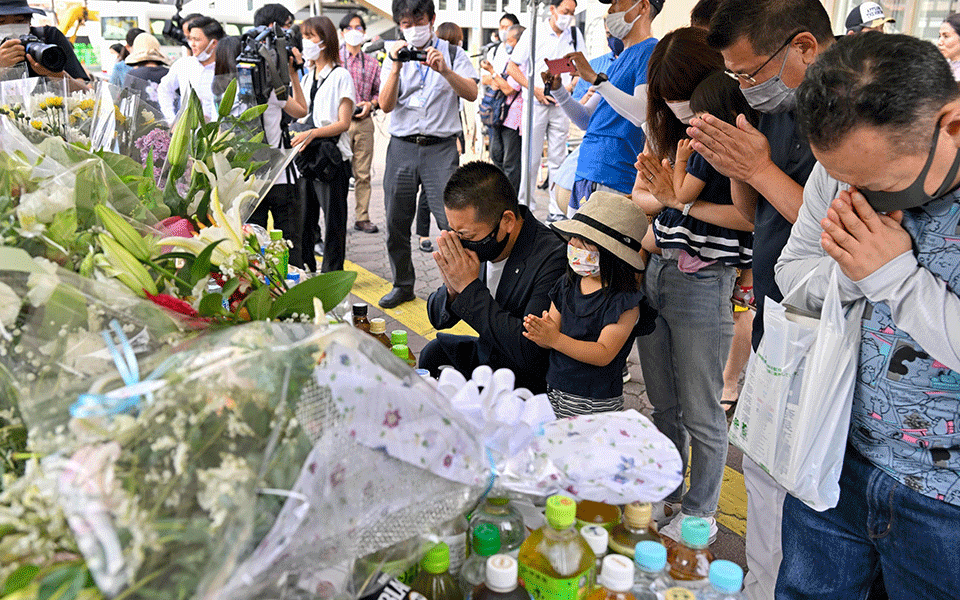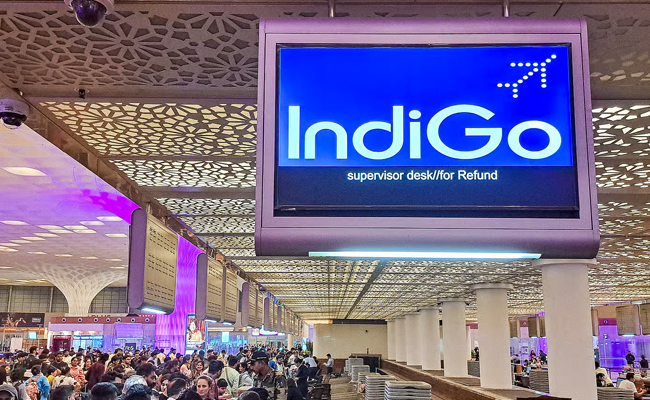Tokyo(AP): The body of Japan's former Prime Minister Shinzo Abe was returned to Tokyo on Saturday after he was fatally shot during a campaign speech in western Japan a day earlier.
Abe was attacked in the city of Nara and airlifted to a local hospital but died of blood loss despite emergency treatment including massive blood transfusions.
Police arrested the attacker, a former member of Japan's navy, at the scene on suspicion of murder. Police confiscated the homemade gun he used, and several others were later found at his apartment.
A black hearse carrying Abe's body and accompanied by his wife, Akie, arrived at his home in Tokyo's upscale residential area of Shibuya, where many mourners waited and lowered their heads as the vehicle passed.
Abe's assassination ahead of Sunday's parliamentary election shocked the nation as a threat to democracy and raised questions over whether security for the former prime minister was adequate.
Even though he was out of office, Abe was still highly influential in the governing Liberal Democratic Party and headed its largest faction, but his ultra-nationalist views made him a divisive figure to many.
When he resigned as prime minister, Abe blamed a recurrence of the ulcerative colitis he'd had since he was a teenager.
He said then it was difficult to leave many of his goals unfinished, especially his failure to resolve the issue of Japanese abducted years ago by North Korea, a territorial dispute with Russia, and a revision of Japan's war-renouncing constitution.
That ultra-nationalism riled the Koreas and China, and his push to create what he saw as a more normal defense posture angered many Japanese.
Abe failed to achieve his cherished goal of formally rewriting the U.S.-drafted pacifist constitution because of poor public support.
Loyalists said his legacy was a stronger U.S.-Japan relationship that was meant to bolster Japan's defense capability. But Abe made enemies by forcing his defense goals and other contentious issues through parliament, despite strong public opposition.
Abe was groomed to follow in the footsteps of his grandfather, former Prime Minister Nobusuke Kishi.
His political rhetoric often focused on making Japan a normal and beautiful nation with a stronger military and bigger role in international affairs.
Japan is particularly known for its strict gun laws. With a population of 125 million, it had only 10 gun-related criminal cases last year, resulting in one death and four injuries, according to police.
Eight of those cases were gang-related. Tokyo had no gun incidents, injuries or deaths in the same year, although 61 guns were seized.
Abe was proud of his work to strengthen Japan's security alliance with the U.S. and shepherding the first visit by a serving U.S. president, Barack Obama, to the atom-bombed city of Hiroshima.
He also helped Tokyo gain the right to host the 2020 Olympics by pledging that a disaster at the Fukushima nuclear plant was under control when it was not.
He became Japan's youngest prime minister in 2006, at age 52, but his overly nationalistic first stint abruptly ended a year later, also because of his health.
The end of Abe's scandal-laden first stint as prime minister was the beginning of six years of annual leadership change, remembered as an era of revolving door politics that lacked stability.
When he returned to office in 2012, Abe vowed to revitalise the nation and get its economy out of its deflationary doldrums with his Abenomics formula, which combines fiscal stimulus, monetary easing and structural reforms.
He won six national elections and built a rock-solid grip on power, bolstering Japan's defense role and capability and its security alliance with the U.S.
He also stepped up patriotic education at schools and raised Japan's international profile. (AP)
Let the Truth be known. If you read VB and like VB, please be a VB Supporter and Help us deliver the Truth to one and all.
Bengaluru (PTI): The Karnataka government has issued directions to municipal corporations across the state to regulate and prohibit feeding pigeons in public places, citing serious public health concerns.
Deputy Secretary to Government V Lakshmikanth has written to the Urban Development Department requesting it to issue directions to the Greater Bengaluru Authority (GBA) and all municipal corporations to take immediate steps to implement the measures.
In an official note dated December 16 issued by the Health and Family Welfare Department and released to the media on Wednesday, the department said uncontrolled feeding of pigeons in public places has resulted in large congregations of birds, excessive droppings and serious health concerns, particularly respiratory illnesses linked to prolonged exposure to pigeon droppings and feathers such as hypersensitivity pneumonitis and other lung diseases.
ALSO READ: Chinese GPS tracker found on seagull near Karwar Coast
"The commissioner, the Greater Bengaluru Authority and the Commissioners and chief officers of other municipal corporations shall take necessary action to mitigate the causes of dangerous disease spread by pigeon and enforce specified guidelines in their respective jurisdiction," the note said.
According to the department, these include a prohibition on feeding pigeons or causing pigeons to be fed in areas where it may cause nuisance or pose a health hazard to the public. Pigeon feeding shall be permitted only in designated areas in a controlled manner, subject to certain conditions.
"The designated areas may be selected in consultation with stakeholders. The responsibility for upkeep of the designated areas and compliance to the directions shall be taken up by some charitable organisation or an NGO. The feeding in designated areas shall be permitted only for some limited hours in the day," it said.
The note further stated that authorised officers of local authorities shall issue on-the-spot warnings and may impose fines for violation of the order, or lodge complaints to prosecute offenders under Sections 271 (Negligent act likely to spread infection of disease dangerous to life) and 272 (Malignant act likely to spread infection of disease dangerous to life) of the Bharatiya Nyaya Sanhita.
It also directed local authorities to conduct public awareness campaigns, including the display of signboards, banners and digital messages, explaining the health hazards associated with pigeon droppings and feathers, the content of the regulatory directions and penalties for violations, and alternative humane methods of bird conservation that do not endanger public health.





